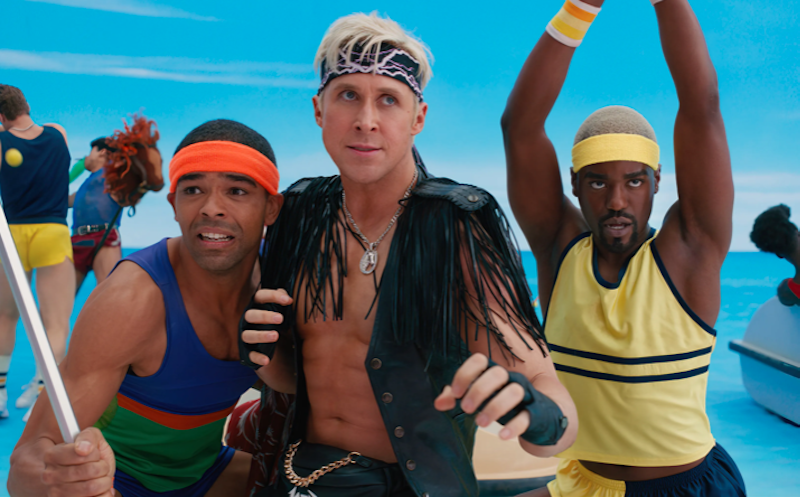Barbie’s big secret is that it says patriarchy but then changes the subject to boyfriends. First we see stallions, corporate execs, Sylvester Stallone—the montage when Ken encounters the male principle in our world. Then Macho Ken steps forth, displaying some more rugged patriarchy: he’s got his man-cloak on and he says Barbie’s going to be his disposable, no-strings sometime companion. But when he’s at his worst, when he’s been lulled by false compliance into a fully inflamed domineering maleness, we get a switcheroo. The boy sits there strumming a guitar for his girl. He sings a draggy song about relationships while looking into her eyes. In Barbie that’s what patriarchy comes down to. It’s your damn boyfriend going on too long when he wants you to like him.
There’s a funny scene earlier, during Ken’s visit to L.A. He learns that sometimes women have a better shot at corporate jobs than men do. Ken: “You’re not doing patriarchy very well.” Corporate exec (complacent): “Oh, we do it well.” They’re just quieter about it now, is the idea. But the film leaves things at that. By contrast, consider the detail given Ken’s offense. We get a specific song and are even told its length (“Push” by Matchbox Twenty, four-and-half minutes). For his part, Macho Ken has one bravura outing, him and his swinging door. If he’d stuck around, I suppose the Barbies would’ve been organized into harems, and then the Kens would’ve started warring among themselves for greater numbers of Barbies.
Instead the movie swaps in Relationship Ken, who isn’t macho, just male. He’s the guy sitting next to her, trying to get by. Maybe he’s just playing at being sensitive, but the whole point of Macho Ken is that he doesn’t play anything for Barbie’s sake, and don’t tell me that was a front. Ken doesn’t evolve strategies, he switches phases—he moves from one personality to another, and in each one he’s simple. Strumming Guitar Ken is another personality and the movie never lets on.
I suppose the film lines up the three great manifestations of male problematicness. These are: the overall sense that things in general, and corporate decisions in particular, are dominated by men; the existence of Andrew Tate cock racketeers; your damn boyfriend. All right, here’s an opinion about relationships. I think that a man who holds forth may hear some detailed advice about how he should feel and behave, and if he doesn’t hold forth he may hear it anyway. A bluster-nagging balance prevails—overall, I mean, not cell by cell. It may go away when there’s a more equal society for women. But we’ve got it now.
Review. The filmmaking involved is spectacular. That’s for big effects and small, from Barbieland’s crowded beach to the drivers manual with its period graphic design. In Black Panther fashion, the movie’s authors were members of the star character’s demo, so let’s applaud director Greta Gerwig and production designer Sarah Greenwood. Margot Robbie makes her icon a convincing doll and then a convincing human, and Ryan Gosling executes work of exquisite detail (note Macho Ken’s dorky moment on the swinging door as he goes inside the Mojo Dojo Casa House).
As a movie Barbie’s a triumph and already set to be a classic. As marketing it plays an adroit game of Twister, going Yeah-I-get-it in regards to every social criticism of the toy while still putting her, or it, front and center as the object of viewers’ dreams and sympathy. (When the criticisms get made, it’s directly to Barbie’s face; we see her cry because of the mean things.) If there’s a prize for being an executive, Robbie Brenner, head of Mattel Films, is the Mattel exec who said yes to Gerwig and her approach.
But everyone agrees that Barbie is something of an op-ed piece, and there I think it’s lacking. The script’s analysis of gender relations seems off the shelf, specifically the shelf holding heavy things that middle-class women can say without thinking too much. The supposed home-run speech is that fallback, a list of “damned if you do, damned if you don’t” complaints concerning society’s expectations of women. I suppose they want the hits; they want to see the anthems of social media transferred to the big screen.
Can’t-win lists like that always convince the people they’re about, but try slotting in some other sort of person. Ken might say he’s wrong if he’s indifferent and he’s wrong if he’s soulful. All right, honest indifference must be accepted, but try too needy and pointedly distant. There’s a combo you run into; the same person may well be both these things at different times or even the same time. With this point made about Ken, turn an x-ray on the Barbie list. Too-much-this-too-much-that works as a singsong to get the gang fired up, I guess. That’s their thing but I hope they move on.

